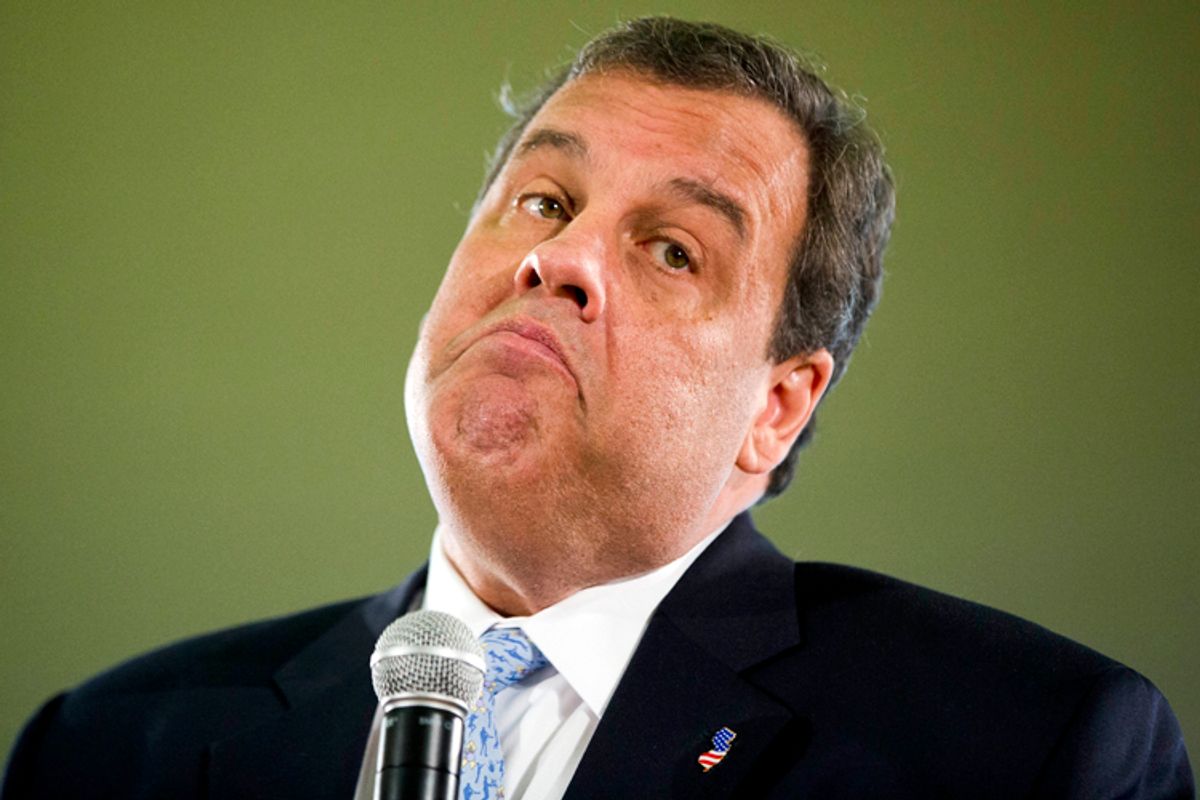New Jersey Gov. Chris Christie is making all the moves necessary to prepare for a 2016 GOP presidential bid. As chairman of the Republican Governors Association, he’s traveled the country stumping for GOP candidates. He’s courting social conservatives, emphasizing his opposition to abortion rights and marriage equality. To burnish his foreign policy credentials, Christie has made highly-publicized trips to Mexico and Israel and asserted that the sheer force of his belligerent personality would be enough to make Vladimir Putin think twice before encroaching on Ukrainian sovereignty.
But Chris Christie will never be president of the United States.
How can we make such a pronouncement more than a year before GOP primary voters cast their first votes? It’s simple: the three pillars for a Christie candidacy – his image as a straight-talking reformer, his supposed acumen as an executive, and his blue-state appeal – have utterly collapsed.
The stench of corruption surrounding Christie's administration doesn’t begin and end with the Bridgegate scandal. Take the firestorm surrounding the state’s troubled pension fund. Robert Grady, the longtime Christie friend and private equity investor whom Christie appointed to head the pension fund in 2010, has shifted billions of dollars in pension funds toward private equity and other financial institutions, many of them closely allied with Christie and his political interests. It’s come at a cost of $3.8 billion to New Jersey taxpayers, while the state’s pension problems are largely responsible for its credit rating having been cut eight times during Christie’s less than five years in office.
Evidence of Christie’s cronyism continues to mount. David Sirota reported yesterday that the Christie administration is weighing a $100 million state subsidy for defense contractor Lockheed Martin, which made a $50,000 contribution to the Christie-headed Republican Governors Association this year. Christie's administration has been generous in its dispersal of such corporate welfare; as Sirota notes, Christie signed legislation last year expanding corporate subsidies, and has handed out over $4 billion in state subsidies during his tenure.
Christie has long castigated corruption and cronyism over the course of his political career.
Not surprisingly, Christie’s mismanagement of New Jersey has taken a toll on his popularity. This morning, residents of the state woke up to a headline blaring, “Christie’s popularity at lowest recorded levels,” after a new Rutgers-Eagleton poll found his favorability rating plummeting to 42 percent, against 45 percent of New Jerseyans who view Christie unfavorably. That marks a seven-point decline in just two months. In the poll, voters’ top concerns were taxes, jobs, corruption and abuse of power, and education. The result comes after other surveys have found Christie is far more unpopular than he was even at the height of the Bridgegate controversy. It’s unlikely Christie’s numbers will improve anytime soon, particularly as he turns his attention toward courting the right-wing GOP base ahead of his 2016 run for president.
But the base of the party continues to either despise Christie or at least view him with deep suspicion. Of course, as Mitt Romney’s 2012 campaign attests, being beloved by Tea Party types isn’t a prerequisite to capturing the GOP nomination. But Romney didn’t have to confront questions of corruption. Nor was his much-touted reputation as a manager as starkly at odds with reality as Christie’s is. George Will might imagine that Christie could turn blue states like Pennsylvania red, but polling shows he wouldn’t even be a competitive candidate in his home state, which re-elected him by a 22-point margin less than a year ago.
Ask yourself, then: if GOP primary voters are already predisposed not to like Christie, if his campaign would be dogged by controversy and scandal, if his home-state record is one of failure and mismanagement, and if Christie offers the party no unique advantage in the general election, what reason do they have to nominate him?

Shares